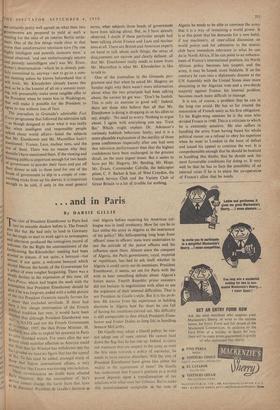. . . and in Paris
By DARSIE GILLIE HE visit of President Eisenhower to Paris had
cast an amiable shadow before it. The French alSo like Ike. He had only to land in Germany for the magic to start to work aga;n as newspapers and television produced the contagious record of
forthcoming On the Right the announcement of the
turtheoming Ike-Khrushchev meeting had been greeted as almost, if not quite, a betrayal—but 4,1111nst, if not quite. a welcome betrayal which should liberate the hands of the Government for a 13°IicY of even tougher bargaining. There was a steady decline in the expression of this view, till p :iris-Presse, which had begun the week with the assumption that President Eisenhower should be 4,t act if he was forgiven, ended with a noble picture s" the two President Generals equally fervent for ab.peace that excluded servitude. If there had 'en. a less abrupt interruption of the French r'relitleal tradition last year, it would have been vicalled that although President Eisenhower was in\ 11. NATO and not the French Government G,L.'n'eeitiber, 1957, the then Prime Minister, M.
calm troubled was able to exploit his presence in Paris p, Britain could troubled waters. For years after the war ri.,riiin„ ot Kt" could mobilise affection as America could b:`‘Ovv that Sir Winston has withdrawn into the or"ground we have no figure that has the appeal ti., Ike. To this must be added, amongst many of serious that follow international affairs, a very er_rint's fear that France was moving into isolation. 1k ,,hese circumstances no doubt have affected .,..L. reception. But the atmosphere of Ike's talri arrival . cannot change the harsh facts that have ° be discussed. President de Gaulle's decision to visit Algeria before receiving his American col- league was in itself revelatory. How far can he in fact utilise the army in Algeria as the instrument of his policy? His helicoptering long hops from officers' mess to officers' mess were undertaken to test the attitude of the junior officers and his influence upon them. Almost since the conquest of Algeria, the Paris government, royal, imperial or republican, has had to ask itself whether in Algeria it could carry out its intentions. President Eisenhower, it seems, set out for Paris with the wish to hear something definite about Algeria's future status. Fourth Republic prime ministers did not hesitate in negotiations with allies to use the argument of their internal difficulties. That is not President de Gaulle's style. But it is his prob- lem. He knows from his experience in holding elections in Algeria how far short he can fall of having his intentions carried out. His difficulty is still comparable-to that which President Eisen- hower and Foster Dulles so long felt in handling Senator McCarthy.
De Gaulle may adopt a liberal policy; he can- not adopt one of mere retreat. He cannot haul down the flag that he has run up. Indeed, to carry out measures that are suspect to the army as even the first steps towards a policy of surrender, he needs to have success elsewhere. Will the visit of President Eisenhower have given him either the reality or the appearance of them'? De Gaulle has understood that France's position as a world power depends upon a transformation of her relations with what were her colonies. But to make this transformation acceptable in the case of Algeria he needs to be able to convince the army that it is a way of remaining a world power. It is at this point that his demands for a new habit, if not machinery, of inter-allied discussion on world policy and for admission to the atomic club have immediate relevance to what he can do in North Africa. If he can point to an enhance- ment of France's international position, his North African policy becomes less suspect, and the army, it may be hoped, more biddable. If on the contrary he runs into a diplomatic disaster at the UN Assembly with the United States once more abstaining in the Algerian vote and a two-thirds majority against France, his internal problem becomes much more difficult to manage.
It is not, of course, a problem that he can in the long run avoid. He has so far treated the restoration of French unity as his first obligation. To his Right-wing enemies he is the man who divided France in 1940. This is a criticism to which he is extremely sensitive. He also suffers in handling the army from having based his whole political career on a refusal to obey his superiors when he went to London, in the hour of defeat and issued his appeal to continue the war. It is comprehensible enough that he should be hesitant in handling this thistle; that he should seek the most favourable conditions for doing so. It may well be that he has to face the possibility of an internal crisis if he is to enjoy the co-operation of France's allies that he needs.


































 Previous page
Previous page